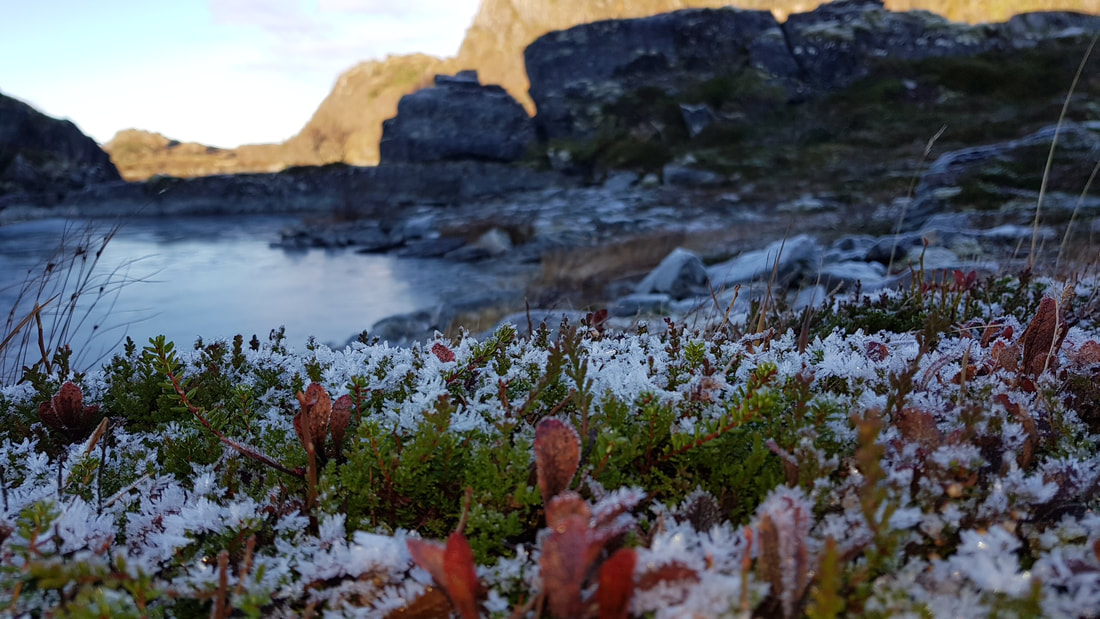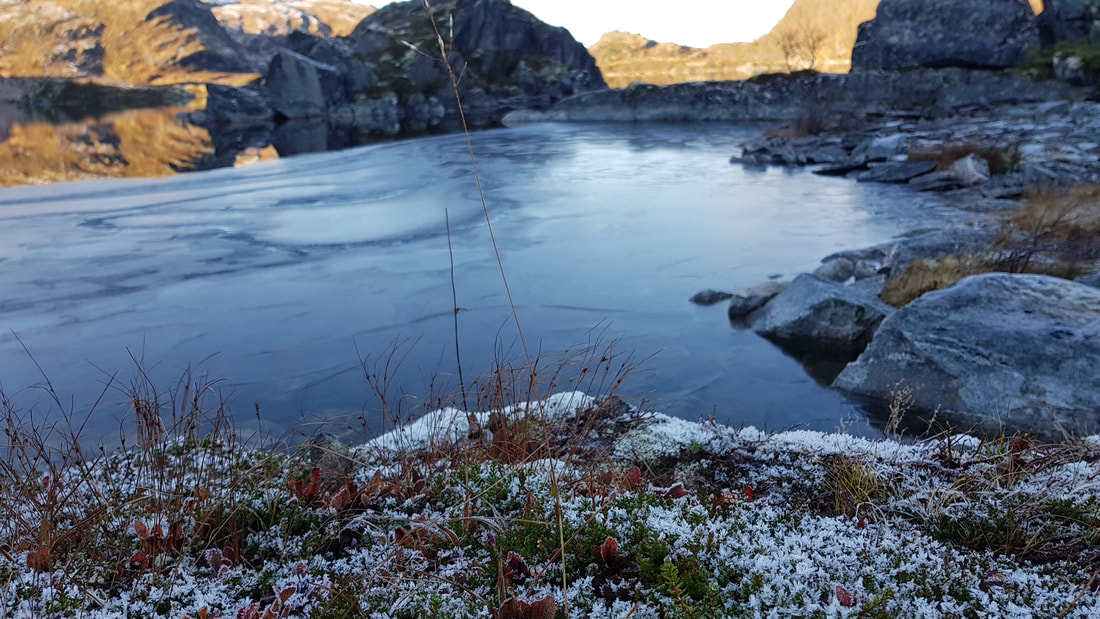|
This is something I wrote this week to mark the passing of my grandmother, which happened earlier this year, during the height of the pandemic. We were surprised by the event, especially as 88 is quite young for a Sponaas. (Actually, more accurately, a Falkflaug, which was her maiden name, and literally means falcon wing). But she had had a long and good life.
I have many fond memories of my Mormor, but one which I’ll always return to in my mind is of how much joy she took in sitting in her kitchen, binoculars in hand, watching the Hurtigruten ferry pass through the fjord stretching out beyond her window. I’ll remember that, just as I’ll remember the way she’d put a spread together every morning for breakfast. Selections of jam, ham, salami, cheese, bread, maybe some yoghurt. Watered-down coffee. Always more than we could stomach, always nice and thoughtfully arranged. And then, there’d be a tin of sugary biscuits she’d have made before we arrived that we’d always get through far too quickly. She was happy to make a second batch. And a third, and a fourth… She taught me to scramble my eggs properly, store leftovers in the fridge, for the next day. You know, it tastes much nicer cold, piled on to a slice or two of salami, bread smeared with quite a bit of butter. Norwegian dairy products. Definitely something to miss when you’re away. Tine Melk. She’d make sure she’d have it in pink, red, as well as her strange green variety, when we came to stay. Trips to the library. I’d get through so many books in those long and lazy Norwegian summers with her. She allowed us all sorts of little indulgences. Hot dogs for dinner, frozen pizza, microwave popcorn dripping in smør, horror films from the local Blockbuster. Back to back Steve Urwin programming on Animal Planet. Bedtimes as we pleased. Friends and cousins round, fun, trips to the chilly sea, matpakke, Mormor stretched out on a deck chair, eyes closed, facing the sun. Thomas and I would catch crabs and pit them against one another in little races we’d hold for them on the sand. Sometimes we’d pull little pretty bits of stone off the large rocks we’d clamber onto, pretending we were characters in our favourite video games, our handful of tiny, pretty purple stones our currency, the ground a quicksand we couldn’t dare step into. When you’re that age, everything is magic. I’ll remember her lovely singing voice, too, lilting and soft, and the lullabies she’d sing me to sleep with before I graduated to my own bedroom downstairs, where the sunlight poured in between curtains in a way that felt very gentle. I’ll also remember trying and failing to sleep up in Edith’s old home Bodø, curtains drawn to block out the midnight sun. The sound of crashing waves. I’ll remember exploring boxes stored in the attic, decades and decades of stuff packed away. I could spend hours up there. Pulling out tiny wooden toys, record album collections, sixties dresses. The bounty seemed endless, so too the possible flights of the imagination they’d spark. I think she knew how much I liked it up there. Would often pull down the stepladder just to indulge my wish to be let loose in that funny little dusty world, alone with all the strange eyeless dolls and delicate trinkets. I’ve been reading through a piece of writing my mother has sent me, a speech from my Edith’s (Mormor’s sister) funeral, that describes their childhood up in Sandmoen. The process has involved looking up a whole bunch of new words, some of which I don’t even know in English. Sjyvotta. Large mittens worn at sea, with possibly an extra pair tucked inside. The men would go out and fish, the women waiting at home to disgorge the hurl. Simpler times, Difficult times. It’s probably something people say a lot. But life must have been so very different back then, up at the edge the Arctic Circle, next to one of the world’s wildest whirlpools. Still, it sounds like whatever changes Haldis lived through, she learnt to take them all in her stride. As her grandchildren, we’ll remember her as very strong in some places, and very soft in others. She had many friends, one of them being my great-aunt Ersika, to whom and from whom she’d send and receive postcards, both parties having to wait for visitors to translate the fond messages they’d send to one another. Two strong, energetic and generous women. Of course they’d find an affinity with each other that transcended linguistic and cultural barriers. Like me, she was curious, and took pleasure in exploring new worlds. She gave me a lovely Chinese jewellery box that played a nice tune when she opened it up and told me stories from her time visiting Beijing. Talked about how many bicycles there were. A very different Beijing to the one I lived in, of course. So many things have changed since Haldis’ childhood days in sleepy Sandmoen. But I’m not sure they changed Haldis all that much. One of the last conversations we had she asked me if I had a job, and if they were paying me. I said yes. She asked me if they were paying me much. “Not really, no,” I replied. “Well, that’s good,” she said. “Too little money is not good. But too much money is also not good,” she said. There are many things I’ll remember about my Mormor. The ring around her finger with Per’s name on it that she kept and wore every day. The 30-year-old bottle of Scotch he left behind that we tried out during my last visit, so strong and intense to taste as to be almost undrinkable; her face during her effort to sip it. The albums upon albums of family photos she’d assembled, showing the hytta in its various stages of development through the years. One with Per’s head poking through the ute du. Others of various relatives sprawled out among the fir trees, soaking up the sun in summer dresses and bikinis from a variety of decades. I’ll remember Mormor when my university friends came to stay. That week, she became everyone’s Mormor. I’ll remember Mormor trying to say “hedgehog,” and struggling at the point where d meets g. Mormor pretending for years not to speak any English so that we’d have to learn Norwegian. The old-fashioned Norwegian words I picked up from her that I still say. I’ll remember her sweet tooth, her stubborn love of the creamiest of cakes. I’ll remember her face, how it was somehow always luminescent, even as the years progressed and her wrinkles deepened. Her eyes that were always steady and bright. The smell of lutefisk wafting through the kitchen doors sometimes. The Fsssh sound she’d make when someone said something a bit rude or naughty. The way she’d whisper; ‘Gud Natt, lille venn,’ before you fell asleep. She’ll be missed, but never forgotten.
1 Comment
|
Sarah KaracsA Berlin-based writer engages in the study of belonging and in-between places after years spent faraway from 'home'. Archives
August 2023
Categories
All
|


 RSS Feed
RSS Feed